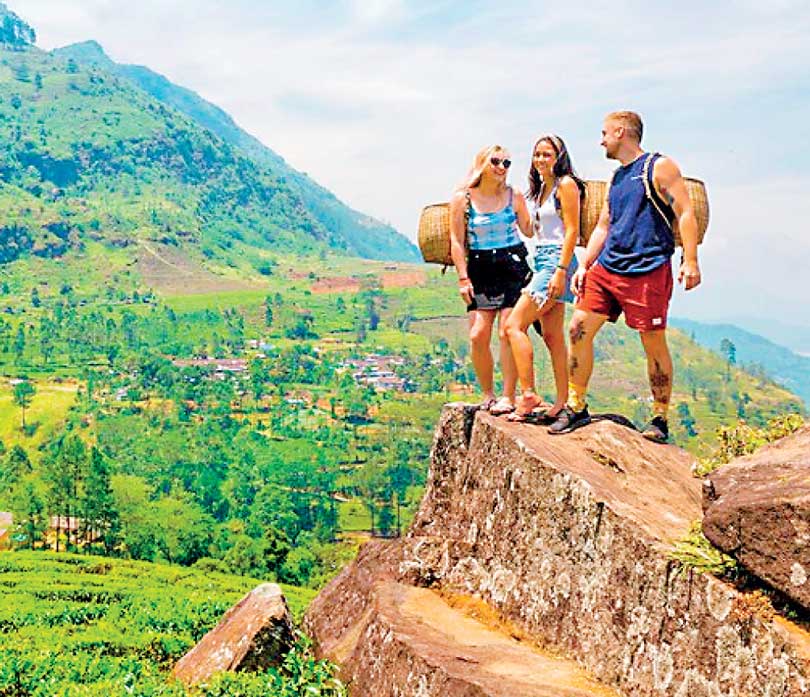Sunday Feb 22, 2026
Sunday Feb 22, 2026
Tuesday, 11 February 2025 00:02 - - {{hitsCtrl.values.hits}}

The next phase of Sri Lanka’s tourism development must be carefully planned, balancing growth with sustainability
 The recent tragic deaths of two foreign guests at the Miracle Colombo City Hostel have cast a stark light on the vulnerabilities within Sri Lanka’s tourism infrastructure. Preliminary investigations suggest that exposure to toxic gases, possibly from adjacent fumigation activities, may have been the cause. This incident underscores a broader, systemic issue: the expansive and largely unregulated informal tourism sector in Sri Lanka.
The recent tragic deaths of two foreign guests at the Miracle Colombo City Hostel have cast a stark light on the vulnerabilities within Sri Lanka’s tourism infrastructure. Preliminary investigations suggest that exposure to toxic gases, possibly from adjacent fumigation activities, may have been the cause. This incident underscores a broader, systemic issue: the expansive and largely unregulated informal tourism sector in Sri Lanka.
Sri Lanka’s tourism industry has witnessed significant growth over the past decade. In fact, January 2025 recorded the highest number of tourist arrivals for any January in history, surpassing the previous record set in January 2018. However, this growth has been accompanied by a surge in informal accommodations, including unregistered guesthouses, homestays, and Airbnb listings. Estimates indicate that the informal sector accounts for approximately 50% of tourist accommodations in the country. A study highlighted that around 50% of tourists in Sri Lanka opt for accommodation in the informal sector (ips.lk).
While the informal sector offers authentic experiences and caters to budget-conscious travellers, its rapid expansion presents several challenges:
Safety and standards
Unregistered establishments often operate without adhering to standardised safety protocols. This lack of oversight can lead to incidents like the recent hostel tragedy, where inadequate safety measures and unregulated practices endanger guests.
Economic implications
The proliferation of unregistered accommodations results in significant tax revenue losses for the Government. Formal establishments contribute between 28% and 32% of their profits in taxes, including VAT, service charges, and other levies. In contrast, many informal operators evade these taxes, creating an uneven playing field and depriving the State of essential revenue.
Reputational risks
Incidents stemming from unregulated operations can tarnish Sri Lanka’s image as a safe and reliable tourist destination. Negative publicity from such events can deter potential visitors, impacting the broader tourism industry.
Other facets of the tourism sector suffering from inadequate regulation
Beyond accommodations, other areas of Sri Lanka’s tourism sector suffer from a lack of oversight and regulation, leading to safety hazards, corruption, and an overall decline in the quality of the tourist experience. Some key issues include:
Vehicle rentals: Tourists frequently rent mopeds and motorbikes without possessing valid licences or insurance. Service providers, often unregulated, may not offer adequate safety measures or insurance coverage, leading to severe consequences in case of accidents.
Tour guides: The presence of unlicensed tour guides, especially in popular tourist areas, can result in misinformation and subpar experiences for visitors.
Liquor licensing: In many resort towns, bars and restaurants operate without proper liquor licences. The stringent requirements and high costs associated with obtaining these licences have led to informal arrangements, often involving unofficial payments to local authorities, fostering corruption.
Environmental concerns: Tourist hotspots are grappling with issues like garbage accumulation and inadequate waste management, detracting from the natural beauty that attracts visitors.
Yala National Park: One of the most prominent examples of over-commercialisation and poor regulation is Yala National Park, where overcrowding has turned a world-class wildlife experience into a chaotic and frustrating one for visitors. Safari jeeps race to sightings, creating a traffic jam of vehicles that obstructs views and diminishes the experience. Given Yala’s vast expanse, there is potential to open up additional areas with a premium pricing model for high-end tourists seeking a more exclusive experience. Additionally, implementing a daily visitor cap would help regulate numbers and ensure a more sustainable approach to wildlife tourism. While this might be a politically sensitive issue, failing to address it will only degrade the park’s reputation and long-term viability.
Of course, these are only some of the issues that require attention—there are several others that must be tackled to ensure a sustainable and high-quality tourism sector.
Moving from growth by default to growth by design
Sri Lanka’s tourism industry is currently growing more by default rather than by design. The Government has set a target of three million tourist arrivals for 2025, but achieving this should not simply be about increasing numbers—it must be about shifting the focus from quantity to quality. The next phase of Sri Lanka’s tourism development must be carefully planned, balancing growth with sustainability, and ensuring that Sri Lanka moves up the value chain to attract higher-spending visitors rather than just more visitors.
A holistic approach is needed—one that involves sitting down with the entire industry and all relevant stakeholders to brainstorm the next phase of tourism development in Sri Lanka. This should go beyond just accommodation regulation and tackle fundamental structural challenges, including national airline strategy, investment in tourism infrastructure, and long-term destination branding. SriLankan Airlines, for example, has a crucial role to play in bringing the right type of tourists from the right markets, ensuring that the country attracts high-yield travellers rather than just budget visitors.
How can we fix this?
Rather than prescribing rigid solutions, the focus should be on collaborative discussion and flexible regulatory models that balance formalisation with ease of doing business. Some ideas worth exploring include:
A two-tier licensing system: Instead of a one-size-fits-all approach, Sri Lanka could implement a two-tier licensing system where large hotels and resorts are subject to comprehensive regulations, while smaller guesthouses and tourism businesses benefit from a simplified, less bureaucratic licensing process that ensures basic compliance without excessive financial or administrative burdens. This could encourage small operators to register formally, ensuring they meet minimum safety and service standards while also contributing to tax revenue.
Reforming taxation and compliance: Implementing a simplified tax structure for small and informal operators would encourage compliance and level the playing field while reducing the burden on regulators. Encouraging digital payment systems would also improve transparency and trackability in the sector.
Strengthening regulation in key areas: From motorbike rentals to wildlife park management, clearer and more enforceable regulations must be introduced to ensure visitor safety and protect the country’s natural assets.
Reforming liquor licensing: The current system is dysfunctional and has created a corrupt informal economy. Licensing must be made more accessible to encourage legal compliance and eliminate the reliance on unofficial arrangements with local authorities.
Addressing overcrowding and sustainability: Sri Lanka must start managing visitor flows better, whether by implementing caps on numbers in national parks, regulating beach tourism hotspots, or spreading tourism beyond the traditional destinations.
The future of Sri Lanka’s tourism industry
Sri Lanka has the potential to become a world-class tourism destination—but this requires a shift from unregulated, ad-hoc growth to structured, sustainable development. The country’s carrying capacity is estimated to be around four million tourists, meaning Sri Lanka must now focus on increasing visitor spending and improving the overall quality of the tourism experience rather than just chasing higher numbers.
The new Government has identified tourism as a key economic driver, but unless there is a clear master plan that incorporates regulation, sustainability, and strategic positioning, the industry risks stagnating in mediocrity rather than reaching its true potential. This is the time to act—to rethink, restructure, and reimagine the next phase of Sri Lanka’s tourism growth.
(The writer is a business leader with extensive experience in hospitality, tourism, and corporate strategy. As Chairman and CEO of privately owned companies and a board member of three publicly listed PLCs, he is actively involved in hotel development, asset management, and investment ventures.)